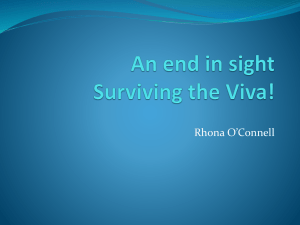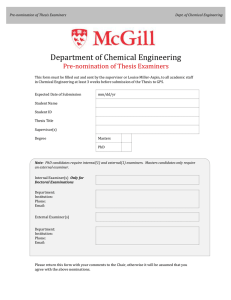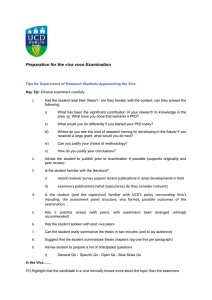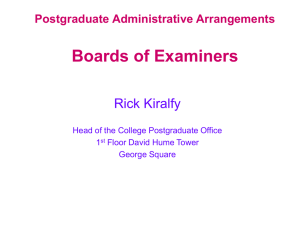Surviving VIVA – VOCE - School of Graduate Studies
advertisement
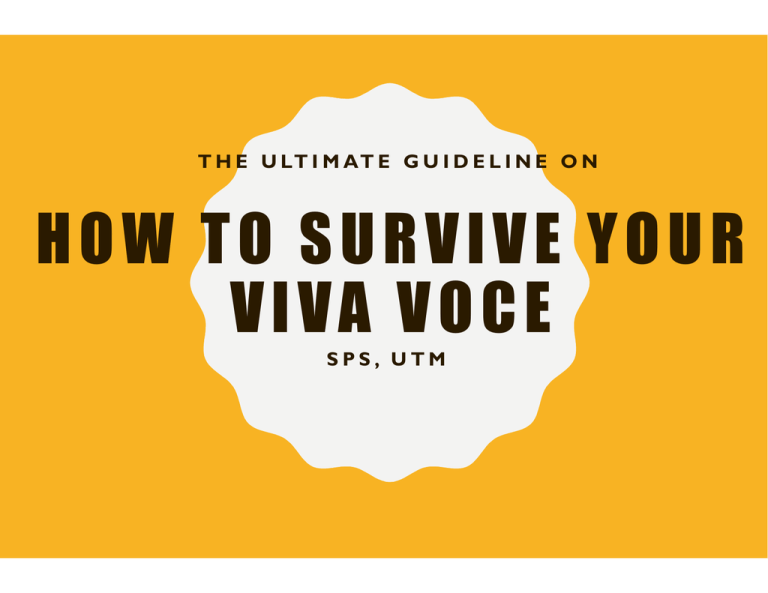
T H E U LT I M AT E G U I D E L I N E O N HOW TO SURVIVE YOUR VIVA VOCE SPS, UTM CONGRATULATIONS! Finally, you have submit your thesis after going through the most challenging journey of your educational life. Complement yourself for the effort and hard work ending with a thesis to be examined and defended during the Viva Voce. Note that Viva Voce is an oral examination and, like any other examination, you need to be well prepared. WHAT IS A VIVA VOCE ? • An oral examination of an expert. A defense, thus an academic conversation among peers. • A platform that allows the examiners to see you in person. • A verbal presentation that permits you to explain to the examiners the new findings of your study in your own words. • A closure to your research. ELIGIBILITY FOR VIVA-VOCE (IN UTM) • Your viva voce session will be set once the School of Graduate Studies received the report from external and internal examiners. • You are not called for the defense if you get an E grade or the examiner found that you plagiarized. • If you got a C or D grade given by one of the examiners, a representativ from SPS will attend your defense. THE VIVA ROOM SETUP AT UTM Drawing courtesy of PM Dr. Ismail Said WHO WILL BE PRESENT? • For most candidates, an internal and an external examiner will be present. • For UTM staff candidates, Industrial Doctoral and Eng. Doctoral candidates, an internal and two external examiners will be present as well. One of the external examiner is occasionally a professional with expertise in your area of research. • Others include: – The supervisor(s) – A Chairman to manage the viva session – An assistant chairman to assist the Chairman in preparing the report. PREPARATION OF PRESENTATION • Title • Background, Research problem and Gap • Methods • Results • Findings • Conclusion • Implication • List of your papers * You are given 15-20 minutes to present your slides. How many slides that yo should prepare for the presentation? SOME OF THE FAVOURITE QUESTIONS 1. In a sentence, what is your research? 2. What is your research underpinning? 3. What is main contribution of your study? 4. If I were to conduct the same research method in another setting, would my result similar as yours? 5. How your findings be applied for the benefits of humanity? 6. Where do you go from here? PREPAREDNESS AND ETIQUETTES • Introduce yourself. • Be smart and humble. • Address the chairman and the examiners politely. Say thanks to your supervisor. • If you don’t know always say that you are do not know or not sure – i is quicker and much safer • Request for a short break if you feel so. • Don’t get defensive • • • • Memorize the authors of seminal references. No pledging from your supervisor to assist you in the defense. Pay careful attention to the questions. Walk your audience through a story. WHAT TO BRING INTO THE VIVA VOCE EXAMINATION? • Bring pen and paper – take notes on long questions • Take your own copy of the thesis into the viva. It is useful to annotate your thesis with post-it notes so that you can find particular sections of your work on points that you anticipate wanting to elaborate. • Sometimes, examiners request to see your data. So, have it handy. MISTAKES OF VIVA VOCE PRESENTATION • • • • • • • • No interaction with panel. Badly prepared slides. Presentation not focused. Talking too softly or too fast. Presentation too long. No flow. Language problem. Monotonous. MISTAKES OF VIVA VOCE – Q&A • DO NOT SAY, “I do not know. My supervisor ask me to do …” • DO NOT ARGUE OR BE SO DEFENSIVE. Accept criticism. • DO NOT ANSWER “YES” OR “NO”. • BEING EVASIVE OUTCOMES Duration of Thesis corrections Grade A No correction; 3 weeks submission of bound thesis to SPS Verification and Certification of the corrected thesis Supervisor Supervisor B1 Maximum 1 month B2 Maximum 6 months Either Internal Examiner or External or both Examiners C1 Maximum 12 months; Thesis reexamination External and Internal Examiners Maximum 12 months; Thesis reexamination and reviva External and Internal Examiners D Not be awarded a PhD but a Lower Degree will be awarded (Master); Maximum 3 months Supervisor E FAIL C2 - THESIS CORRECTIONS • The extent of your correction can range from a few spelling mistakes (grade a) to rewriting (Grade B1 and B2) or adding chapters and resubmit (Grade C1 or C2). • In order to be sure that your corrections make the right changes: – Take notes during the viva and write them up immediately after – Meet with your supervisor (s) to discuss the corrections and prepare a table listing down all the required corrections – Analyse the examiners' report carefully to make sure that you have dealt with all of the issues that they raise – Is best to proofread your work again. – Ensure that your supervisor (s) have read your corrected thesis before submit to SPS. CONCLUSION • Practice makes perfect. • I heard this somewhere ... “... During your presentation, you are the KING. And if you show the panel you are KIN during the presentation, you will remain KING during the Q&A. Otherwise, the panel w become KING and you will be eaten by them ...” anonymous

